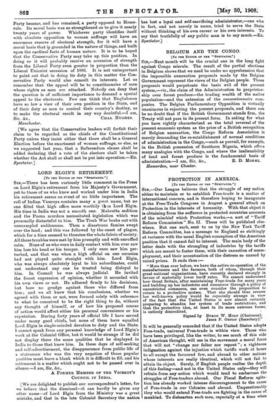LORD ELGIN ' S RETIREMENT.
[To THE EDITOR OF THE "SPECTATOR.".1 SIR,—There has been curiously little comment in the Press on Lord Elgin's retirement from his Majesty's Government, yet to those of us who knew and worked under him in India his retirement seems an event of no little importance. The roll of Indian Viceroys contains many a great name, but no one filled that high office more worthily th m Lord Elgin. His time in India was not a smooth one. Mahratta sedition and the Poona murders necessitated legislation which was personally distasteful to him. The Tirah War broke out with unexampled suddenness. Then a disastrous famine swept over the land ; and this was followed by the onset of plague, which for a time seemed to threaten the whole fabric of society. All these troubles were met by him promptly and with unruffled calm. None of us who were in daily contact with him ever saw him lose his head or his temper. I only once saw him per- turbed, and that was when a high official on one occasion had not played quite straight with him. Lord Elgin, who was always absolutely loyal to his subordinates, could not understand any one he trusted being disloyal to him. In Council lie was always judicial. He invited the freest expression of opinion, whether it accorded with his own views or not. He adhered firmly to his decisions, but bore no grudge against those who differed from him ; and we all knew that his conclusions, whether we agreed with them or not, were formed solely with reference to what he conceived to be the right thing to do, without any thought of himself, or of how his proposed course of action would affect either his personal convenience or his reputation. During forty years of official life I have served under many good chiefs, but none of them have equalled Lord Elgin in single-minded devotion to duty and the State. I cannot speak from any personal knowledge of Lord Elgin's work at the Colonial Office, but it would be strange if he did not display there the same qualities that he displayed in India to those that knew him. In these days of self-seeking and self-advertisement, the disappearance from public life of a statesman who was the very negation of those popular palities must leave a blank which it is difficult to fill, and his retirement is a matter which ought not to be passed over in silence.—I am, Sir, &c., A FORMER MEMBER OF THE VICEROY'S COUNCIL IN INDIA.
[We are delighted to publish our correspondent's letter, for we believe that the dismissal—it can hardly be given any other name—of Lord Elgin from the Ministry was a great mistake, and that in the late Colonial Secretary the nation has lost a loyal and self-sacrificing administrator,—one who in fact, and not merely in name, tried to serve the State without thinking of his own career or his own interests. To say that truthfully of any public man is to say much.—En.
Spectator.]






































 Previous page
Previous page